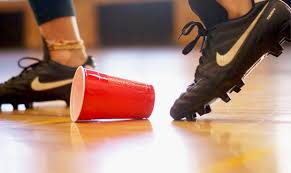BE ABOUT IT

We have all been there, after an even or competition and all you want is an ice cold adult beverage! Whether you are a college athlete celebrating a big win with your team or a weekend warrior who just completed a fitness event with your buddies, alcohol consumption is common. In the moment, everything is great and you are having the time of your life. BUT you can hinder your body’s ability to recover properly especially if things get out of hand.
College athletes (No Parents No Rules, right?), chronic alcohol use can lead to nutritional deficiencies, depressed immune system which can prolong healing of injuries causing you to have a longer return to play process. This is the last thing you want during your sport season. According to a post by ECU Sports Nutrition the injury rate for drinkers is 54.8% and for non-drinkers 23.5%. To recover properly from exercise and competition your body needs to restore glycogen, muscle protein and fluid balance. Alcohol can hinder this process due to increasing urine output. Yes, beer does contain carbohydrates but it does not contain enough along with any electrolytes to recover. The greater the number of beverages consumed increases this process and further dehydrates your body. Another effect on your body is disrupted sleep. From my experience in working with college athletes they don’t sleep enough regardless. Alcohol has been shown to disrupt restorative sleep cycles therefore decreasing the quality of sleep one gets. This then negatively affects the body’s ability to produce hormones that are associated with muscle growth and recovery.
But what most do not know is that research has shown that a hangover can cause about an 11% decrease in aerobic capacity.
Here’s a few quick facts to keep in the back of your mind: consuming five for more beverages in one night can affect your brain, body and athletic performance for up to three days. Two consecutive nights of drinking can affect your brain, body and athletic performance for up to 5 days. So, if you are celebrating a big win Friday and Saturday and then have another game on Tuesday or Wednesday your performance could be hindered by your choice of fluids! Some of the long-term effects that alcohol can have are weight gain and a decrease in vitamin and mineral absorption due to excretion.
I am in no way shape or form condoning the consumption of alcohol, but simply being smart about it can do your body less harm especially if you are an in-season athlete. For example, some collegiate teams will have a “dry season” to obtain a more consistent and higher level of performance. The “dry season” in my opinion is to reduce the occurrence of the athletes getting into trouble but also to keep them from being hungover during competition to elevate performance. According to the NSCA the effects of a hangover can cause several physical symptoms. These symptoms include feeling fatigued which is not out of the ordinary. But what most do not know is that research has shown that a hangover can cause about an 11% decrease in aerobic capacity. The effects on anaerobic performance still requires further research. Upperclassmen, this could be another aspect that you need to mentor your younger teammates. This is most likely the first time they have experienced this type of freedom and you need to keep them in check. You are only as good as your weakest link when it comes to a team performance.
Now get out there, crush your training so you can crush your competition and just be conscious about the beverages you crush!


